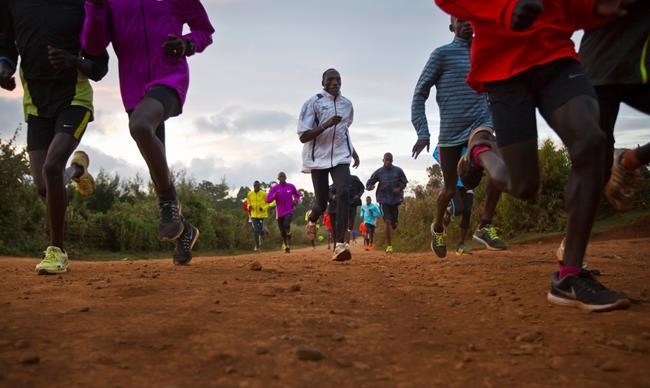
FILE - In this Saturday, Jan. 30, 2016 file photo, Kenyan athletes train together just after dawn, in Kaptagat Forest in western Kenya. World Anti-Doping Agency (WADA) officials declared Kenya's drug-fighting agency out of compliance Thursday, May 12, 2016, a move that places the track powerhouse's participation in this summer's Olympics in jeopardy. (AP Photo/Ben Curtis, File)
Republished May 12, 2016 - 3:33 PM
Original Publication Date May 12, 2016 - 11:45 AM
MONTREAL - Canadian Olympian Beckie Scott wants athletes at the 2016 Olympics to feel confident they won't be competing against drug cheats.
The chair of the athletes committee at the World Anti-Doping Agency read a list of proposals at the agency's Foundation Board meeting Thursday asking for action in the war on systemic, government-endorsed doping programs.
The annual WADA meeting drew perhaps its biggest media contingent ever as the embattled agency deals with revelations of a wide ranging doping program in Russia.
Scott said that "if they cannot be assured Russian athletes will be clean, they shouldn't be there (at the Rio Games)."
The Canmore, Alta. resident was backed by fellow athlete representatives at the meeting, including former track star Edwin Moses and ex-fencer Claudia Bokel.
The agency announced this week it will launch a probe into doping in Russia following a report on the "60 Minutes" program in the U.S., in which whistle blower Vitaly Stepanov said many athletes using banned substances, including three gold medallists, participated in the 2014 Winter Games in Sochi, Russia.
A New York Times report spoke of Russia's agents swapping urine test bottles to help athletes in Sochi escape detection.
"There's a lot that can be done," Scott said later. "I do believe WADA heard the call from the athletes.
"It was quite loud and clear and supported by the athletes in the room. We have many voices from athletes around the world from all sports who called on us to present their challenges and troubles and worries and concerns here today."
Asked if Russia should be allowed to compete in Rio, Scott said "I think any country that's involved in doping should not be competing at the Games. That's not just limited to Russia."
Earlier Thursday, the Canadian Centre for Ethics in Sport, the country's anti-doping governing body, renewed its call for the International Association of Athletics Federations and the International Olympic Committee to stand firm on the suspension of Russian athletes.
WADA also declared Kenya non-compliant after government doping legislation failed to pass, raising the possibility that its powerful track team may miss the Rio Games. With the Russian athletics squad already suspended and not certain to be reinstated before the Games, it could remove two powerful teams from the track in Rio.
The Agency, which currently has only one full-time investigator, is in the process of hiring a chief investigating officer to be based at its headquarters in Montreal to head a team to look into cases of systemic doping. It also hopes to find ways to encourage whistle blowers and make sure they are protected from any reprisals.
A report presented at the meeting painted a grim picture of Russia since its anti-doping lab was suspended in November, with the British taking over testing in the country. It showed that of 247 tests, 99 failed because they were unable to locate the athletes. It also spoke of doping control agents being unable to enter some cities with military installations because they are closed to foreigners.
It said only a third as many tests have been taken on Russian athletes compared to the same period a year earlier. There were 49 positive tests, but all but two of them were for meldonium, the heart drug that was put on the prohibited substances list on Jan. 1 and caught more than 100 athletes from several countries off guard, including tennis star Maria Sharapova.
Some athletes have successfully appealed their positive tests by saying they took meldonium before it was banned. WADA member and former French sports minister Valerie Fourneyron said they must learn from the controversy to study how long drugs stay in the system before they are prohibited.
News from © The Canadian Press, 2016